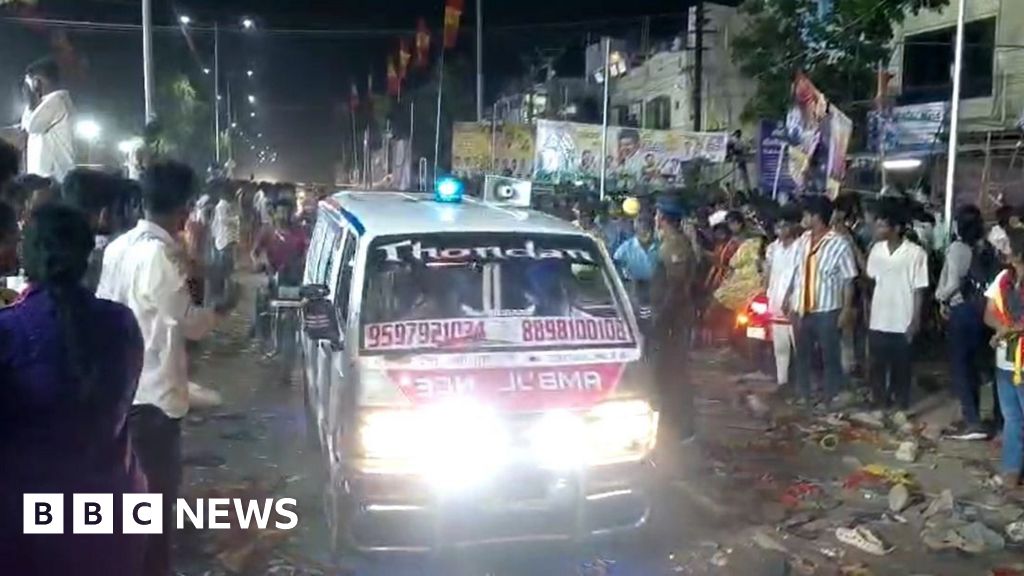
EAST ASIA
Written by Stylo News: AI-Powered, Multi-Source Global News

Images © their owners, publicly available, for informational purposes.
Map of Events
The events occurred in Tamil Nadu, India, and London, United Kingdom, with visits also noted in Scotland, UK.
Locations
Event Updates
Deadly Crush at Political Rally in Tamil Nadu, India
Executive Summary
On a Saturday in late September 2025, a devastating crush occurred at a political campaign event in Karur district, Tamil Nadu, India, where tens of thousands had gathered to support actor-turned-politician Vijay. The event was delayed by several hours, leading to overcrowding and chaos. At least 36 people, including children, women, and men, died in the crush, and over 50 were injured. Images showed people fainting in the packed crowds, and personal belongings such as shoes and water bottles were scattered on the ground. The Tamil Nadu Chief Minister MK Stalin confirmed the fatalities and announced compensation of one million rupees for the families of the deceased. An inquiry into the incident was promised. Vijay expressed deep sorrow and condolences to the victims' families. Indian Prime Minister Narendra Modi described the incident as unfortunate and deeply saddening. Such deadly crushes have been recurrent in India, with previous incidents at major festivals and public events earlier in the year.
Situation
The political rally was intended as a campaign event for Vijay, a popular figure in Tamil Nadu, drawing an unexpectedly large crowd. The delay in the event's start contributed to increased crowd density and panic. Emergency services and hospitals in the region were overwhelmed, prompting calls for additional medical assistance from neighboring districts. The government swiftly announced financial compensation and an official inquiry to investigate the causes and prevent future tragedies. Public grief and shock were widespread, with personal stories of loss highlighting the human cost. The incident underscores ongoing challenges in managing large public gatherings in India, where crowd control and safety measures have historically been insufficient, leading to repeated fatalities in mass events.
International Impact
The tragedy drew international attention to the risks of mass gatherings in India, echoing previous fatal incidents at religious and sporting events. Indian leaders, including Prime Minister Modi, publicly acknowledged the severity of the event, emphasizing the need for improved safety protocols. The incident may influence international perceptions of public safety in India, potentially affecting tourism and foreign engagement in large-scale events. It also highlights the broader issue of crowd management in populous nations, prompting discussions on best practices worldwide.
Decision Maker Perspectives
Tamil Nadu State Government: Declared compensation for victims' families, ordered an inquiry, and requested additional medical support to manage the crisis.
Vijay (Politician): Expressed heartbreak and sorrow, offering condolences and prayers for those affected.
Indian Prime Minister Narendra Modi: Condemned the incident as unfortunate and deeply saddening, signaling national concern.
Source Perspectives
BBC: Provided detailed coverage emphasizing the human tragedy and government response, maintaining a neutral and factual tone.
ANI News Agency: Reported personal accounts and official statements, highlighting the emotional impact on families.
Australian Prime Minister Albanese Joins UK PM in Warning Against Far-Right Rise During UK Visit
Executive Summary
In late September 2025, Australian Prime Minister Anthony Albanese visited the United Kingdom, where he met with British Prime Minister Sir Keir Starmer at 10 Downing Street. Both leaders expressed concern over the rising influence of far-right political parties and populist movements in their respective countries and globally. The discussions included topics such as defense, security, trade, and the economy, with a shared commitment to democratic values. Albanese brought Australian beers as a gesture of goodwill. Starmer has recently introduced measures such as mandatory digital IDs to combat illegal immigration, a topic that has become contentious in Europe. Both leaders are focused on protecting the AUKUS pact amid geopolitical challenges, including the America First agenda of former US President Donald Trump. The visit also included Albanese meeting King Charles III in Scotland, emphasizing the strong ties between Australia and the UK.
Situation
The visit took place against a backdrop of increasing political polarization and far-right activism in the UK and Australia. Starmer's government faces challenges related to immigration control and public concern over illegal migrants crossing the English Channel. Albanese, freshly re-elected in Australia, shares Starmer's progressive approach and concern about populist movements threatening democratic norms. The leaders' discussions reflect a strategic alliance aimed at countering geopolitical instability and domestic political extremism. The visit was marked by symbolic gestures and public messaging warning against the dangers posed by far-right groups, which have been active in protests and political campaigns in both countries.
International Impact
The joint stance by the Australian and British Prime Ministers signals a coordinated effort among Western democracies to address the rise of far-right extremism and populism. Their commitment to the AUKUS security pact underscores ongoing strategic cooperation in the Indo-Pacific region. The warnings against far-right movements resonate internationally, as many countries grapple with similar political challenges. This visit may influence allied nations to strengthen democratic institutions and border controls while promoting moderate political discourse. It also reflects concerns about the impact of populist politics on international alliances and global stability.
Decision Maker Perspectives
Australian Prime Minister Anthony Albanese: Advocates for progressive values, warns against far-right extremism, and emphasizes shared democratic principles with the UK.
UK Prime Minister Sir Keir Starmer: Focuses on combating illegal immigration, curbing populism, and strengthening digital security measures.
King Charles III: Welcomed Albanese, symbolizing the enduring relationship between the UK and Australia.
Source Perspectives
9News Australia: Reports the visit with a focus on political implications and the leaders' shared concerns about far-right threats.
Getty Images: Provides visual documentation of the visit and related events, highlighting the diplomatic context.